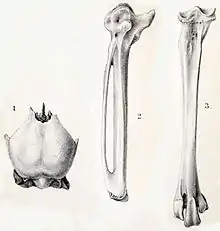Malagasy shelduck
The Malagasy shelduck (Alopochen sirabensis), also known as the Sirabe shelduck, is an extinct species of waterfowl in the shelduck subfamily. It was described from subfossil bones found at Antsirabe in central Madagascar.[1] Radiocarbon dating of subsequently discovered material shows that the bird survived to at least 1,400 years ago, after human settlement of the island. A close relative of the Egyptian goose (Alopochen aegyptiaca), the bird is sometimes considered a subspecies of the extinct Mauritius sheldgoose; in this case it would become Alopochen maritiana sirabensis.[2][3]
| Malagasy shelduck Temporal range: Holocene | |
|---|---|
 | |
| Skull and limb fossils | |
| Scientific classification | |
| Kingdom: | Animalia |
| Phylum: | Chordata |
| Class: | Aves |
| Order: | Anseriformes |
| Family: | Anatidae |
| Genus: | Alopochen |
| Species: | A. sirabensis |
| Binomial name | |
| Alopochen sirabensis (Andrews, 1897) | |
| Synonyms | |
| |
References
- Andrews, C. W. (2008). "On some Fossil Remains of Carinate Birds from Central Madagascar". Ibis. 39 (3): 343. doi:10.1111/j.1474-919X.1897.tb03281.x.
- Goodman, SM (1999). Holocene bird subfossils from the sites of Ampasambazimba, Antsirabe and Ampoza, Madagascar: Changes in the avifauna of south central Madagascar over the past few millennia. In: Adams, N.J. & Slotow, R.H. (eds) Proc. 22 Int. Ornithol. Congr., Durban. Johannesburg: BirdLife South Africa. pp. 3071–3083. Archived from the original on 2014-05-19.
- Turvey, Samuel T (2009). Holocene Extinctions. Oxford University Press. p. 67. ISBN 9780191579981.
This article is issued from Wikipedia. The text is licensed under Creative Commons - Attribution - Sharealike. Additional terms may apply for the media files.
